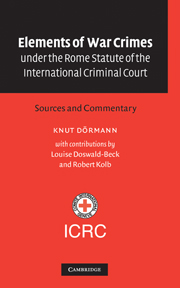 Elements of War Crimes under the Rome Statute of the International Criminal Court
Elements of War Crimes under the Rome Statute of the International Criminal Court Book contents
- Frontmatter
- Contents
- Foreword by Dr Jakob Kellenberger, President of the International Committee of the Red Cross
- Foreword by Ambassador Philippe Kirsch, QC
- Table of cases by alphabetical order
- Table of cases by jurisdiction
- Table of treaties and other international instruments
- List of abbreviations
- 1 Introduction
- 2 Legal value of the elements of crimes
- 3 General Introduction adopted by the PrepCom
- 4 Introduction to elements of war crimes listed in Article 8 of the Rome Statute
- 5 Article 8(2)(a) ICC Statute – Grave breaches of the 1949 Geneva Conventions
- 6 Article 8(2)(b) ICC Statute – Other serious violations of the laws and customs applicable in international armed conflict
- 7 Article 8(2)(c) ICC Statute – Violations of common Article 3 of the 1949 Geneva Conventions
- 8 Article 8(2)(e) ICC Statute – Other serious violations of the laws and customs applicable in armed conflicts not of an international character
- Appendix: Request from the Governments of Belgium, Finland, Hungary, Mexico, the Republic of Korea and South Africa and the Permanent Observer Mission of Switzerland to the United Nations regarding the text prepared by the International Committee of the Red Cross on the mental element in the common law and civil law systems and on the concepts of mistake of fact and mistake of law in national and international law
- Bibliography
- Index
3 - General Introduction adopted by the PrepCom
Published online by Cambridge University Press: 08 August 2009
- Frontmatter
- Contents
- Foreword by Dr Jakob Kellenberger, President of the International Committee of the Red Cross
- Foreword by Ambassador Philippe Kirsch, QC
- Table of cases by alphabetical order
- Table of cases by jurisdiction
- Table of treaties and other international instruments
- List of abbreviations
- 1 Introduction
- 2 Legal value of the elements of crimes
- 3 General Introduction adopted by the PrepCom
- 4 Introduction to elements of war crimes listed in Article 8 of the Rome Statute
- 5 Article 8(2)(a) ICC Statute – Grave breaches of the 1949 Geneva Conventions
- 6 Article 8(2)(b) ICC Statute – Other serious violations of the laws and customs applicable in international armed conflict
- 7 Article 8(2)(c) ICC Statute – Violations of common Article 3 of the 1949 Geneva Conventions
- 8 Article 8(2)(e) ICC Statute – Other serious violations of the laws and customs applicable in armed conflicts not of an international character
- Appendix: Request from the Governments of Belgium, Finland, Hungary, Mexico, the Republic of Korea and South Africa and the Permanent Observer Mission of Switzerland to the United Nations regarding the text prepared by the International Committee of the Red Cross on the mental element in the common law and civil law systems and on the concepts of mistake of fact and mistake of law in national and international law
- Bibliography
- Index
Summary
During the negotiations it became apparent that there are certain issues that arise in all crimes and are worth clarifying. But these do not necessarily qualify as elements. Therefore the PrepCom decided that a general introduction applicable to all crimes should precede the section on the elements of particular crimes.
The relationship between the crimes and general principles of criminal law presented the Working Group on Elements of Crimes with a particularly difficult drafting problem. Long discussions on this issue were held during an intersessional meeting convened for this purpose by the government of Italy and the International Institute of Higher Studies in Criminal Sciences, in Siracusa, Italy. The results of the Siracusa meeting provided a useful basis for the discussions at the March 2000 session of the PrepCom, which tentatively agreed on the General Introduction. This text was confirmed with slight modifications during the final session of the PrepCom in June 2000. It reads as follows:
1. Pursuant to article 9, the following Elements of Crimes shall assist the Court in the interpretation and application of articles 6, 7 and 8, consistent with the Statute. The provisions of the Statute, including article 21, and the general principles set out in Part 3 are applicable to the Elements of Crimes.
2. As stated in article 30, unless otherwise provided, a person shall be criminally responsible and liable for punishment for a crime within the jurisdiction of the Court only if the material elements are committed with intent and knowledge.[…]
- Type
- Chapter
- Information
- Elements of War Crimes under the Rome Statute of the International Criminal CourtSources and Commentary, pp. 9 - 14Publisher: Cambridge University PressPrint publication year: 2003
